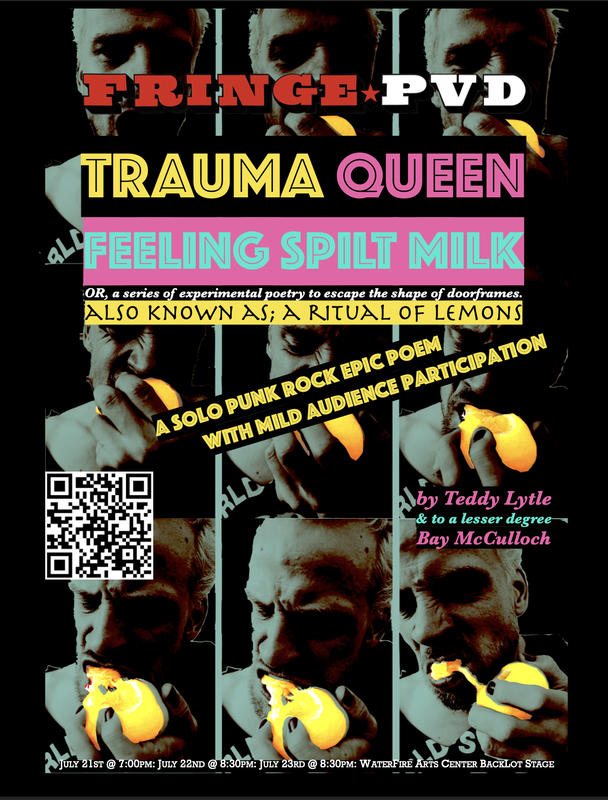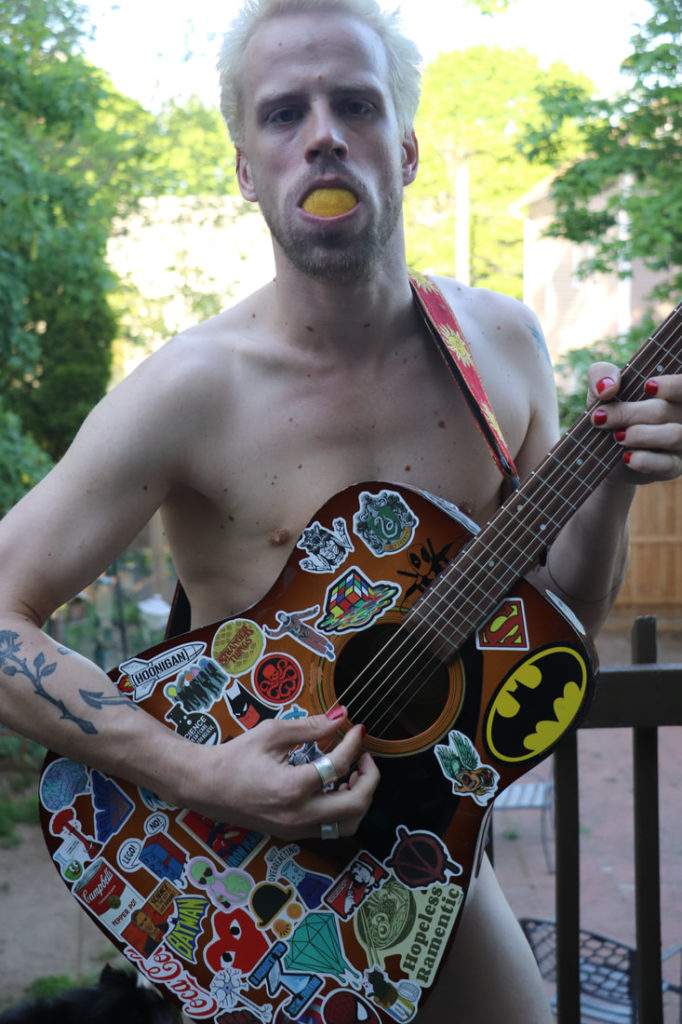
production poster found on FringePVD website. this poster is badass.
Presented by FringePVD and The Wilbury Theatre Group
By and Featuring Teddy Lytle and Bay McCulloch
July 21 – 23, 2022
The Waterfire Arts Center Back Lot
475 Valley St,
Providence, RI
45 minutes without intermission
Review by Nicole LaBresh
PROVIDENCE, RI – When I think of Fringe, at the forefront of the word salad it conjures is “vulnerability.” Fringe in particular brings out the most intensely personal, soul-baring works. It does so largely by allowing artists free reign to put on whatever show they want. It is, among other things, a festival of works from the heart.
For the uninitiated, the Fringe Festival is a theatre festival devoted to experimental or fringe theatre works. It got its start in Edinburgh, but now has chapters all over the world, including one in Providence presented by The Wilbury Theatre Group, now in its ninth year. At a Fringe, you will see works the likes of which you probably have never seen before and that you may never see again. The performances range from poetry to music, dance to clownery, and things that defy any categorization. After two years without a live Fringe Festival because of COVID-19, local artists have a ton of pent up expression ready to be unleashed.
FringePVD veteran Teddy Lytle’s (Tr)auma Queen, Feeling Spilt Milk, OR a series of experimental poetry to escape the shape of doorframes, also known as, a ritual of lemons decidedly fits that notion of Fringe as a place where artists can bare their souls. (Tr)auma Queen is about their experience with trauma, addiction and mental health, the stigma surrounding them, sexuality and queer gatekeeping, the importance of ritual and community, and feeling helpless given the state of the world we live in. If this sounds like a laundry list too varied to tackle in under an hour, it does not feel that way. After all, in Lytle’s, or in fact, anyone’s lived experience, all of these and more inform each other and are inextricably linked, even if not in ways others can fully appreciate.

Image found via FringePVD website
As in subject matter, the categorization of this show is hard to pin down to any one specific genre: its description bills it as “More than a concert, less than a play” and as “a solo punk rock epic poem with mild audience participation.” It feels like a conversation, albeit with some musical elements. This comes from the audience participation which asks the audience to bare its soul as well.
Before the show, audience members are encouraged to write a question they are too afraid to ask and/or their greatest fear and/or a secret on index cards. These are submitted anonymously and read out loud during the show.
Lytle is assisted in their performance by a video projection and by his fiancée Bay McCulloch. The projection was somewhat hindered by the sun at the 7pm performance but, by the end, the sun had slipped behind the building. Future 8pm performances should avoid this problem.
This is one of the many perks of performing outside in addition to the noise from local traffic and seeing the look on passersby as they walked past at inopportune moments. That said, none of that took away too much from the performance; Lytle is engaging enough to watch that nothing can detract from that. The projection assists the performance by providing definitions, highlighting metaphors and showing just how handsome a notable psychiatrist is.
Because it is mostly a solo show, McCulloch is not a major focus. She serves as a stand-in for various voices in Lytle’s life (really, various voices in the life of anyone who struggles with their mental health). She keeps him on track in the ADHD section, bringing them back to the present from their guitar-strumming reveries.
In what amounted to the most memorable moments, she demonstrates an unsupportive (and later on a supportive relation) reacting to a relapse. This is familiar to anyone with mental illnesses. Loved ones often don’t know how to deal with dark moments and will react with frustration rather than acceptance and support. The latter scene demonstrates how the simple words “that’s okay” become radical in the face of mental illness: the notion that it is okay not to be okay, and that at your lowest, you still deserve unconditional love and acceptance.
Like much of Fringe, (Tr)auma Queen is not standard fare theatre; it isn’t a traditional narrative. Rather, it is an honest and open conversation about various dimensions of mental health. Lytle is commended for their artistry and, yes, vulnerability in the pursuit of addressing how we as a society are failing people who are struggling with mental illnesses. We can and must do a better job providing support and understanding.
UPDATE: In a previous edit of this post, the incorrect pronouns were used for both Lytle and McCulloch. Lytle: he/him. McCulloch: she/her. We sincerely apologize for the errors!
